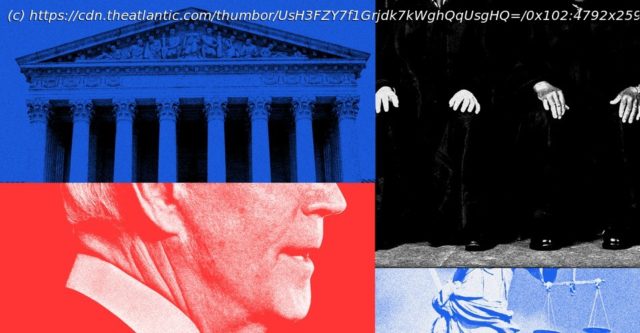He could now have a chance to shape it.
Joe Biden became president in no small part because he’d been vice president. Had he become neither, he would have been remembered for something else entirely: the fate of Robert Bork and Clarence Thomas, two of the most divisive Supreme Court nominees in living memory. Now Biden has a chance to leave his most distinct imprint on a Court that shaped his legacy every bit as much as he influenced its makeup. His first pick could happen at any time: The oldest justice, Stephen Breyer, is 82 and under pressure to resign should the Democrats’ slender Senate majority vanish in the 2022 midterm elections. Few presidents have been as bound up with the Supreme Court as Biden. A lawyer by training, he took over the Senate Judiciary Committee in 1987 under an agreement struck with Democratic Senator Edward M. Kennedy that would prove to be a risky trade-off. Biden had announced that he was running for president three weeks before President Ronald Reagan nominated Bork. Under the best of circumstances, the committee’s workload would eat into the time he needed to compete in a large Democratic field. But the position would also give Biden a national profile, for better and worse. In October of that year, Bork was defeated by the most lopsided vote of any Supreme Court nominee in American history. Biden was in the same spot four years later when Thomas was confirmed by the slimmest margin in more than a century, following Anita Hill’s allegations that he had sexually harassed her. Each set of hearings became a nationally televised drama that earned Biden enemies and admirers who’ve never forgotten his outsize role. In the Bork case, he demonstrated pliable convictions and wobbly political instincts before settling on an approach that effectively sank the nomination. In his treatment of Hill, Biden revealed an obtuseness that he would spend the next three decades trying to live down. “There has never been a president who has spent more time and effort dealing with the Supreme Court in several different roles than this president, dating back to when he first came to the Senate in the early 1970s,” Jeffrey Blattner, a former chief counsel to Kennedy, told me. “He’s seen it all, and he’s been through it all.” W hen the nation got its first close look at the new Judiciary Committee chair, there wasn’t all that much to see. Biden was approaching middle age, no longer the wunderkind who’d been elected at the age of 29. On the Senate floor he was surrounded by people whose stature he might never equal: John Glenn of Ohio, the first American to orbit Earth; Bob Dole of Kansas, who’d twice been awarded the Purple Heart for combat in World War II; and Kennedy, who would compile one of the strongest legislative records in history. As for Biden, he still seemed in search of an identity. He came off as a caricature of a retail politician: eager to please and impress, someone whose skill was reading the room and offering the talking points it wanted to hear. “I would never consider Joe a heavyweight,” former Senator John Danforth, a Missouri Republican who was Thomas’s chief patron, told me. “He’s a politician in the best sense of the word, the kind of person who liked to work things out. He was not, say, Ted Kennedy in his charisma or talent. But he had that same quality of ‘Okay, how far can I get working the system to do this?’” Liberals were unhappy that Kennedy had agreed to turn over such an important chairmanship to someone they deemed unreliable. The year before, Biden had given an interview to The Philadelphia Inquirer in which he’d blurted out that, absent any incriminating information about Bork, he’d be inclined to vote for him should he be nominated. Estelle Rogers, then the director of the Federation of Women Lawyers, said Biden should relinquish the chairmanship if he was unable to “exercise the kind of leadership we expect.” The ultimatum reflected the stakes. Bork would be succeeding Lewis Powell, a pro-business Republican who’d been nominated by President Richard Nixon in 1971. An American Civil Liberties Union analysis showed him to be the swing vote in 20 “important civil liberties cases.” Conservatives had grown impatient with Reagan’s failure late in his second term to usher in the social agenda he had promised, and were delighted to see Powell gone. With Congress blocking Reagan’s push to outlaw abortion and permit prayer in public schools, the White House concluded that the Supreme Court was the only path left. Installing Bork would cement a conservative majority that would roll back the liberal overreach of the federal courts. “In many areas—abortion, crime, pornography, and others—progress will take place when the federal judiciary is made up of judges who believe in law and order and a strict interpretation of the Constitution,” Reagan said in a speech to the Knights of Columbus in 1986. Bork embodied that philosophy. He was an architect of the “originalist” school of jurisprudence, holding that judges should be guided by what the Framers intended when they wrote the Constitution. Adherents believed this was the only way to keep judges tethered to the nation’s founding compact rather than their own sensibilities. “My objection to Bork was not simply one of methodology and approach,” Laurence Tribe, a Harvard Law School professor emeritus who advised Biden during the Bork proceedings, told me. “It was that his methodology would lead to a constitutional universe that was profoundly unacceptable and inconsistent with the whole idea of the Constitution as a document not frozen in time.” In his writings, Bork had criticized Supreme Court decisions maintaining that privacy is protected under the Constitution, the interpretation that underpins Roe v. Wade. Alarmed by the prospect of Bork’s elevation, and especially by the threat he posed to abortion rights, liberal groups mobilized and pressed Biden to oppose Bork. At the time, that was asking a lot. In the previous 57 years, the Senate had rejected only two nominees to the Supreme Court. “The conventional notion, which was widely shared, was that it was not appropriate for a senator to vote against a nominee on philosophical grounds so long as he was the president’s choice, was not a child molester, and had an IQ above ground level,” Tribe told me.






